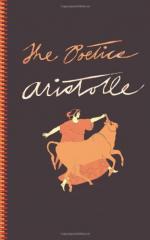
|
| Name: _________________________ | Period: ___________________ |
This quiz consists of 5 multiple choice and 5 short answer questions through Section III.
Multiple Choice Questions
1. What does Aristotle say about what many writers do with history?
(a) Many writers manipulate it.
(b) Many writers lie about it.
(c) Many writers discard history completely.
(d) Many writers take it as their archetype.
2. What is the name that Aristotle uses for everyday words that every member of the audience can understand?
(a) "Current" words.
(b) "Monosyllabic" words.
(c) "Simple" words.
(d) "Common" words.
3. Aristotle explains that metaphors frequently rely upon what?
(a) Analogy.
(b) Exaggeration.
(c) Rhyme.
(d) Deception.
4. According to Aristotle, how does tragedy achieve the emotion it inspires?
(a) Contradiction.
(b) Using the element of surprise.
(c) Irony.
(d) Deceit.
5. Aristotle says that epic poetry ought to follow what?
(a) Rules set by Aristotle.
(b) Established conventions.
(c) The format of tragedy.
(d) Guidelines identified by certain organizations.
Short Answer Questions
1. What type of poetry does Aristotle say focuses on serious and important actions?
2. What does Aristotle say occurs at the beginning of a tragic story?
3. In a tragedy, how does Aristotle say the element of surprise should come about?
4. When an evil character of a tragic story is suddenly thrust into misfortune, it has been said that this satisfies the moral sense of the audience, but Aristotle asserts that the misfortune does not inspire what?
5. Based on "Poetics" by Aristotle, how many deeds does Homer say Odysseus accomplished?
|
This section contains 256 words (approx. 1 page at 300 words per page) |

|




